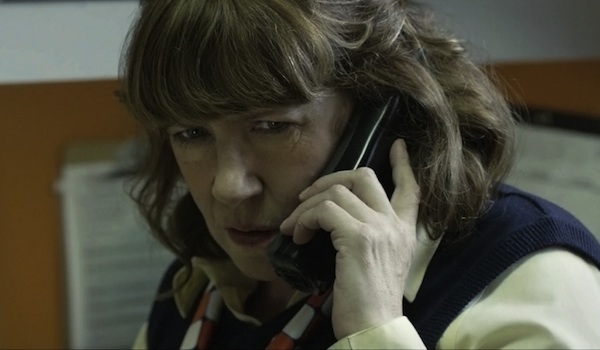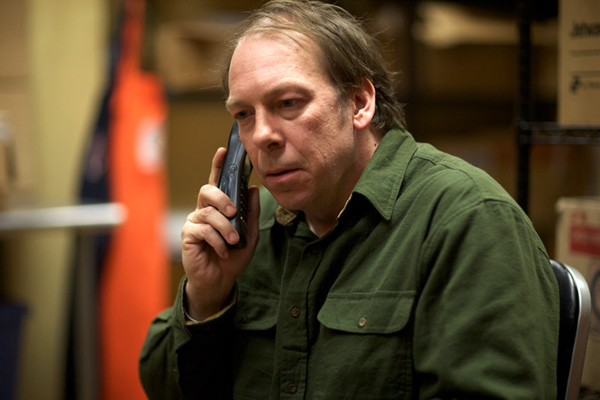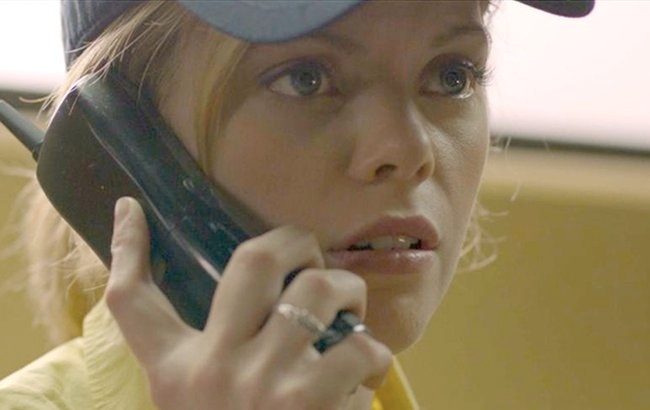Compliance Review
Late in Craig Zobel’s searing psychological drama,
Compliance, one character remarks, “I did a bad thing.” It’s the kind of realization that would have been useful 30 minutes earlier, but also one only hindsight could make so clear. Zobel asks his audience to take a leap into a very weird world where orders trump common sense and morals, but the film’s weirdest note is in its first frame, which tells us
Compliance is based on a true story.
In 2004, a McDonald’s in Mount Washington, Kent. was thrust into the national spotlight. Its manager received a call from a man identifying himself as a police officer. The attractive young woman at the counter, this man said, had stolen money out of a customer’s purse, and the manager needs to find the money and keep watch over the young woman until the officer can extricate himself from his investigation to interrogate her himself.

Although the names of the individuals involved — as well as the restaurant — are changed in
Compliance, the record of events follows the true story fairly well. Ann Dowd plays the manager, Sandra, while Dreama Walker is Becky, this sad story’s primary victim. “Officer Daniels” (Pat Healy) tells Sandra if she cannot find the money in Becky’s pockets or purse, she must perform a strip search. Becky reluctantly agrees, not wanting to go to jail.
From there, everyone loses his or her mind. Sandra is ordered to leave Becky’s clothes in her unlocked car, and she complies. She’s ordered to have a man watch over Becky, so she calls up her fiancé, Van (Bill Camp). He’s ordered to examine Becky’s body, and he complies. She’s ordered to perform sex acts on Van, and she complies. It’s a sickening situation, and you’ll just want to shake those on screen, but
Compliance, admirably, neither judges nor justifies its characters’ actions. This even-handed approach means Zobel can focus on maximizing tension.

The film’s close-up cinematography, framed tightly by the clutter of a typical restaurant storage room, as well as its thoughtfully sporadic score, help the film burrow under your skin, but it’s Zobel’s words that keep it there. His Daniels is the chilliest sort of villain. You don’t know his motivations, but his methodical method of taking notes during the call signals that he’s someone who’s indescribably twisted but also quite good at what he does.
And in Sandra, Zobel’s found an individuals with layer upon layer. Her “Gee, I don’t knows” make you feel for her, make you see her as another victim of sorts in this strange scenario. Yet, her personal feelings toward Becky are made plain in the film’s opening 15 minutes. If she thought something — anything — was remotely off with this Daniels guy, would she end the charade? Probably, but not definitely. It’s Dowd, then, who gives
Compliance‘s finest, most nuanced performance. The film might be too small for end-of-year awards consideration, but should it hang on and earn her a nomination of some kind, it’d be incredibly well-deserved.

The rest of the performances are serviceable, but nothing special. It should be pointed out that Walker has the unenviable job of spending most of this film nude. Zobel’s camera, though, isn’t interested in exploiting her. Despite the lurid nature of the subject matter, actual nudity in the film is kept to a minimum (in most scenes, she’s covered up with an apron).
There will be those who can’t watch
Compliance because it’s too distressing, and it’s probably not the kind of film anyone — not even a strong admirer of the film like myself — will want to take in more than once. The film’s voyeuristic quality is, at times, overwhelming, and as far as faults go, this discomfort is topped only by the patness of the film’s final 15 minutes.
On the whole, though,
Compliance is a success despite not being the feel-good story of the year. It’s more an indictment of certain facets of human nature than an ultimately uplifting cautionary tale. But the way second-time director Zobel brings such a strong cinematic touch to this bizarre true story is mighty impressive.
 Although the names of the individuals involved — as well as the restaurant — are changed in Compliance, the record of events follows the true story fairly well. Ann Dowd plays the manager, Sandra, while Dreama Walker is Becky, this sad story’s primary victim. “Officer Daniels” (Pat Healy) tells Sandra if she cannot find the money in Becky’s pockets or purse, she must perform a strip search. Becky reluctantly agrees, not wanting to go to jail.
From there, everyone loses his or her mind. Sandra is ordered to leave Becky’s clothes in her unlocked car, and she complies. She’s ordered to have a man watch over Becky, so she calls up her fiancé, Van (Bill Camp). He’s ordered to examine Becky’s body, and he complies. She’s ordered to perform sex acts on Van, and she complies. It’s a sickening situation, and you’ll just want to shake those on screen, but Compliance, admirably, neither judges nor justifies its characters’ actions. This even-handed approach means Zobel can focus on maximizing tension.
Although the names of the individuals involved — as well as the restaurant — are changed in Compliance, the record of events follows the true story fairly well. Ann Dowd plays the manager, Sandra, while Dreama Walker is Becky, this sad story’s primary victim. “Officer Daniels” (Pat Healy) tells Sandra if she cannot find the money in Becky’s pockets or purse, she must perform a strip search. Becky reluctantly agrees, not wanting to go to jail.
From there, everyone loses his or her mind. Sandra is ordered to leave Becky’s clothes in her unlocked car, and she complies. She’s ordered to have a man watch over Becky, so she calls up her fiancé, Van (Bill Camp). He’s ordered to examine Becky’s body, and he complies. She’s ordered to perform sex acts on Van, and she complies. It’s a sickening situation, and you’ll just want to shake those on screen, but Compliance, admirably, neither judges nor justifies its characters’ actions. This even-handed approach means Zobel can focus on maximizing tension.
 The film’s close-up cinematography, framed tightly by the clutter of a typical restaurant storage room, as well as its thoughtfully sporadic score, help the film burrow under your skin, but it’s Zobel’s words that keep it there. His Daniels is the chilliest sort of villain. You don’t know his motivations, but his methodical method of taking notes during the call signals that he’s someone who’s indescribably twisted but also quite good at what he does.
And in Sandra, Zobel’s found an individuals with layer upon layer. Her “Gee, I don’t knows” make you feel for her, make you see her as another victim of sorts in this strange scenario. Yet, her personal feelings toward Becky are made plain in the film’s opening 15 minutes. If she thought something — anything — was remotely off with this Daniels guy, would she end the charade? Probably, but not definitely. It’s Dowd, then, who gives Compliance‘s finest, most nuanced performance. The film might be too small for end-of-year awards consideration, but should it hang on and earn her a nomination of some kind, it’d be incredibly well-deserved.
The film’s close-up cinematography, framed tightly by the clutter of a typical restaurant storage room, as well as its thoughtfully sporadic score, help the film burrow under your skin, but it’s Zobel’s words that keep it there. His Daniels is the chilliest sort of villain. You don’t know his motivations, but his methodical method of taking notes during the call signals that he’s someone who’s indescribably twisted but also quite good at what he does.
And in Sandra, Zobel’s found an individuals with layer upon layer. Her “Gee, I don’t knows” make you feel for her, make you see her as another victim of sorts in this strange scenario. Yet, her personal feelings toward Becky are made plain in the film’s opening 15 minutes. If she thought something — anything — was remotely off with this Daniels guy, would she end the charade? Probably, but not definitely. It’s Dowd, then, who gives Compliance‘s finest, most nuanced performance. The film might be too small for end-of-year awards consideration, but should it hang on and earn her a nomination of some kind, it’d be incredibly well-deserved.
 The rest of the performances are serviceable, but nothing special. It should be pointed out that Walker has the unenviable job of spending most of this film nude. Zobel’s camera, though, isn’t interested in exploiting her. Despite the lurid nature of the subject matter, actual nudity in the film is kept to a minimum (in most scenes, she’s covered up with an apron).
There will be those who can’t watch Compliance because it’s too distressing, and it’s probably not the kind of film anyone — not even a strong admirer of the film like myself — will want to take in more than once. The film’s voyeuristic quality is, at times, overwhelming, and as far as faults go, this discomfort is topped only by the patness of the film’s final 15 minutes.
On the whole, though, Compliance is a success despite not being the feel-good story of the year. It’s more an indictment of certain facets of human nature than an ultimately uplifting cautionary tale. But the way second-time director Zobel brings such a strong cinematic touch to this bizarre true story is mighty impressive.
The rest of the performances are serviceable, but nothing special. It should be pointed out that Walker has the unenviable job of spending most of this film nude. Zobel’s camera, though, isn’t interested in exploiting her. Despite the lurid nature of the subject matter, actual nudity in the film is kept to a minimum (in most scenes, she’s covered up with an apron).
There will be those who can’t watch Compliance because it’s too distressing, and it’s probably not the kind of film anyone — not even a strong admirer of the film like myself — will want to take in more than once. The film’s voyeuristic quality is, at times, overwhelming, and as far as faults go, this discomfort is topped only by the patness of the film’s final 15 minutes.
On the whole, though, Compliance is a success despite not being the feel-good story of the year. It’s more an indictment of certain facets of human nature than an ultimately uplifting cautionary tale. But the way second-time director Zobel brings such a strong cinematic touch to this bizarre true story is mighty impressive.